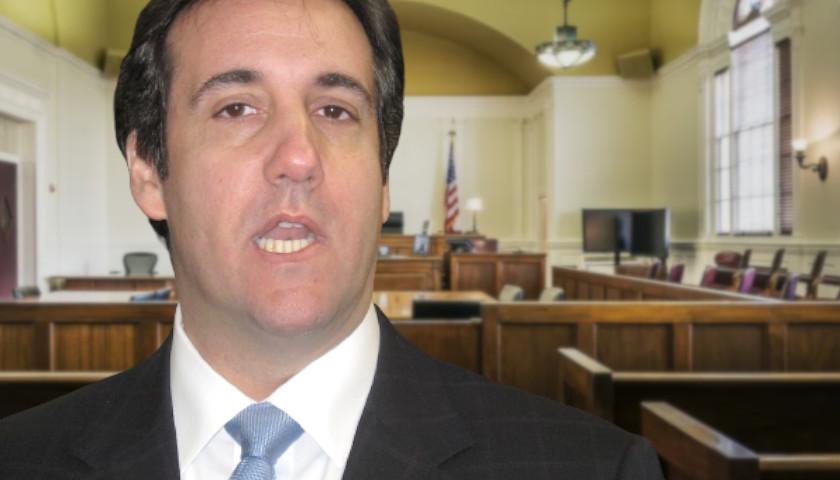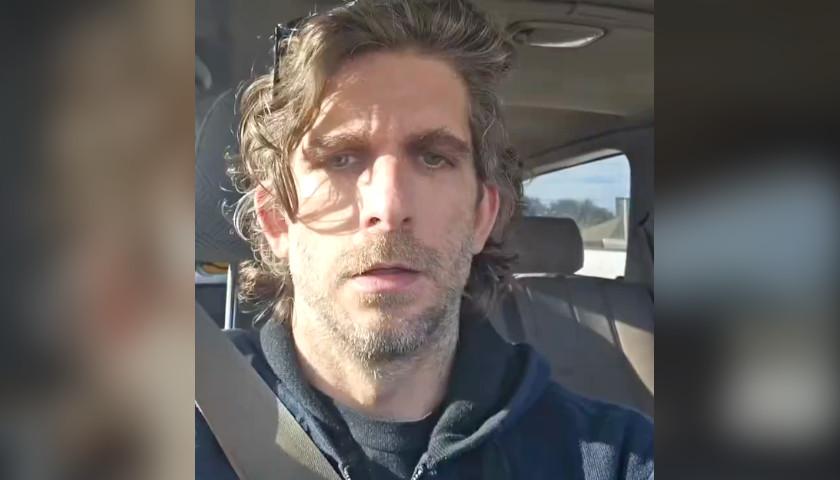by Nick Givas and John Solomon
An attorney who advised disgraced Trump organization lawyer Michael Cohen provided Manhattan prosecutors with voluminous documentation, including contemporaneous emails and memos, purporting to show that in 2018 Cohen wanted Donald Trump to help cover his legal bills and repeatedly claimed he had no evidence incriminating the former president in a hush money deal with porn actress Stormy Daniels.
“Cohen said he had no information against Trump,” one memo summarizing attorney Robert Costello’s interactions with Cohen stated. That memo, dated April 2019, recounted Costello’s interview with federal prosecutors about conversations he and colleagues had with Cohen a year earlier.
Costello, a former federal prosecutor who has represented famous clients like George Steinbrenner, Leona Hemsley, Rudy Giuliani and Steve Bannon, told Just the News on Tuesday he provided Manhattan District Attorney Alvin Bragg’s office with more than 300 pages of emails, memos and texts chronicling his dealings with Cohen.
He said his documents showed Cohen took out a bank loan known as a HELOC — on his own — during the 2016 presidential election to pay Stormy Daniels $130,000 under a nondisclosure agreement so she would remain quiet about her alleged relationship with Trump. Cohen bragged he kept the situation quiet so that Melania Trump and Cohen’s own wife wouldn’t learn about it, Costello said in an interview on the John Solomon Reports podcast, recounting what he said Cohen told him back in 2018.
“He said,” Costello recalled, “‘I didn’t believe the information, but I knew that this was a situation that would cause embarrassment. So I negotiated with this lawyer, and we worked out a an NDA … for the payment of $130,000.’
“And I said, ‘Did you get that money from Donald Trump?’ ‘No.’ ‘Did you get it from any Trump Organization?’ ‘No.’
“I said, ‘Did you take that money out of your own savings or checking?’ ‘No.’
“I said, ‘Well, how’d you get the money?’ He said, ‘I took out a HELOC loan.’ ‘Why would you take out a HELOC loan to cover something like this?’ He said ‘because I wanted to keep it secret. If I took money from my account, my wife would know about it. I didn’t want my wife to know about it. I didn’t want Melania Trump to know about it.’ He said, ‘That’s why I did it that way.'”
“Now, if you’re gonna do it that way, that means you’re keeping it from Donald Trump and Melania Trump,” Costello added, summarizing the story he offered grand jurors and Manhattan prosecutors.
In a 2019 summary of Costello’s interview with the U.S. attorney’s office in the Southern District of New York (SDNY), Costello alleged that in 2018 Cohen wanted to talk to Giuliani, then a lawyer for the 45th president, about getting Trump or his insurance company to pay Cohen’s legal bills.
“Yes, during the long conversation on June 23, 2018, Cohen asked me to talk to Giuliani and ultimately to Trump about Cohen applying to Aeon Insurance, under the D&O policy, to pay the legal fees, and Cohen did not want ‘the big guy’ to oppose Cohen’s request,” Costello said, according to the summary of the interview with federal prosecutors.
Costello also provided a contemporaneous email with a colleague from June 2018 in which he recounted his conversations with Cohen about Giuliani and payment of legal bills.
“He asked me to communicate with Rudy and have him tell the President that all of these stories about cooperating are bullshit,” Costello wrote. “To tell him that he is not talking to reporters. He is not talking and friends (cq). These stories from sources are fiction.”
“I believe the issue for Cohen is money,” Costello explained in the email. “Who is going to pay for these lawyers.”
Cohen did not respond to requests by email or text from Just the News for comment. His lawyer Lanny Davis declined to answer questions, instead offering an attack on one of the reporters in this story.
“I decline to comment to Mr. Solomon who, sadly, in my opinion since I was once a great admirer of his, no longer practices fact-based journalism,” Davis said.
In interviews with MSNBC, Cohen acknowledged having contacts with Costello, but suggested the former federal prosecutor was “‘making up stories” to the grand jury and carrying out “a typical Trump play.”
In those interviews, Cohen also claimed he did not believe he had waived his attorney-client privilege from his conversations with Costello. “I don’t recall waiving anything,” he said. “But, again this is, I don’t know what he’s talking about.”
But one of the documents that Costello provided to Just the News shows that Cohen signed a declaration in 2019 for federal prosecutors waiving any claim of privilege from his interactions with Costello.
“Although I do not believe that any of my communications with Costello or other lawyers at DHC are subject to attorney-client privilege, I hereby waive whatever attorney-client or other privilege that might be argued have attached to such communications,” the February 2019 declaration from Cohen stated.
You can read that document here.
“Using Cohen as a witness would be the greatest gift to Trump,” Harvard law professor emeritus Alan Dershowitz told Just the News. “If they’re smart, they will try to work around Cohen, try to pick some of the other witnesses, maybe some tapes … I don’t think they’re gonna put Cohen on the witness stand.”
Costello testified Monday to a grand jury in Manhattan helping Bragg’s office investigate a hush money payment to Daniels during the 2016 presidential campaign. Costello said he volunteered to testify to the grand jury because he believed he had information that would impeach the story Cohen has given on television about what he told the grand jury.
“He’s making some of this stuff up,” Costello told the John Solomon Reports podcast on Tuesday. “He’s embellishing.”
Costello said he told grand jurors that Cohen appeared distraught when they first met in spring 2018 in a hotel, and that he even talked of committing suicide. He said he repeatedly asked Cohen if he had incriminating evidence on Trump that could be used to get Cohen a plea deal and that Cohen repeatedly said he did not.
“Even a serial liar tells the truth, once in a while,” Costello said. “And when a person like Michael Cohen is in extremis, he’s ready to kill himself, that’s the one time that he’s going to give up Donald Trump if he had something at that point in time. But he didn’t.”
Costello’s account in the interview Tuesday matches what he told Congress during the Russia collusion investigation against Trump, according to a summary of that interview he turned over to prosecutors.
In that 2019 testimony to the House Intelligence Committee, Costello said he had asked Cohen if he had any useful information to offer up to prosecutors regarding Trump, but Cohen replied that he had none.
“We said, let’s talk about your options, do you have any info on Trump, a get out of jail free card, but he said he didn’t have anything on him, nothing,” Costello testified.
After mentioning potential financial wrongdoing within the Trump Inaugural Committee, Cohen admitted once again “he didn’t have — or at least would not admit — that he had anything of value to trade,” Costello told the congressional investigators.
In a separate memo summarizing his interview with federal prosectors, Costello said Cohen never mentioned any conversations about Trump directing a payment to Stormy Daniels and that the payment he arranged was simply viewed as “a cost of doing business.”
“First I don’t t think Cohen believed it (the unprotected sex with a porn actress), or that Trump did it,” Costello is quoted in the memo as telling the federal prosecutors back in 2019.
The contemporaneous emails also show that Cohen discussed the idea of getting a pardon but that Costello dismissed those as “premature” in 2018 since no charges had been filed yet and other options like a grant of immunity from prosecutors were also possible.
“I think I have come up with a possible solution to Mike Cohen’s fear of a state or locaI prosecution should he receive a pardon,” Costello wrote in an April 2018 email to a colleague after they met Cohen at a hotel. “First immunity would put him technically in the same position. It is immunity from federal prosecution and it does not cover state prosecutions.”
The emails and memos also showed how Costello tried to convey that Trump held no animus for Cohen and was not worried what his former lawyer might tell prosecutors while trying to avoid the appearance of tampering with a potential prosecution witness.
“Our issue is to get Cohen on the right page without giving him the appearance that we are following instructions from Giuliani or the President,” Costello wrote in a May 2018 email to a colleague. “In my opinion this is the clear, correct strategy.”
Costello’s testimony and media interviews were part of a larger offensive by Trump defenders against Cohen as Manhattan prosecutors near the end of their grand jury probe in Manhattan and decide whether to charge the former president.
On Monday, the GOP-led U.S. House Judiciary Committee sent a letter to Bragg, demanding he testify about Trump’s potential indictment.
The letter was sent by Judiciary Committee Chairman Rep. Jim Jordan (R-Ohio), who was joined by House Oversight Committee Chairman James Comer and House Administration Committee Chairman Bryan Steil.
“The only potential speculated crime that could be alleged here would be a violation of campaign finance law, according to one scholar, a charge that the Justice Department has already declined to bring,” Jordan wrote.
The Ohio Republican added that the statute of limitations for any alleged crimes related to the former president is set to expire, which would explain Bragg’s “rush” to push for this unprecedented indictment.
– – –
John Solomon is an award-winning investigative journalist, author and digital media entrepreneur who serves as Chief Executive Officer and Editor in Chief of Just the News. Nick Givas is a reporter for Just the News.
Photo “Michael Cohen” by IowaPolitics.com. CC BY-SA 2.0.





